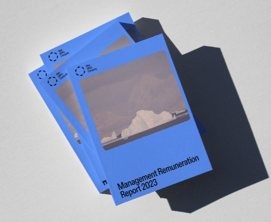Sustainability is an increasingly important differentiator in the aquaculture industry, which has put aquafeed and the raw material behind it under the microscope. But what makes aquafeed ingredients sustainable? That’s a question we asked ourselves more than a decade ago when we set out to be the most sustainable krill company in the world.
Behind the QRILL Aqua product for aquafeed is a series of sustainable decisions and actions that make this statement true. It starts with our everyday activities, whether at sea or in our production plant and extends all the way to our corporate strategy and investments in research and innovation.
Here’s our top 10 list of key decisions we made to create a more sustainable aquaculture industry. As they say, the proof is in the pudding.
1. We harvest an incredibly small percentage of the krill biomass
This is an important differentiator for the krill industry. The United Nations defines a sustainable harvest quota as about 10% of the biomass each year. In area 48 in Antarctica, where Aker QRILL Company fish's for krill, the quota is less than 1% per year. This leaves 99% of the biomass for the local predators.
2. We restrict fishing areas to protect the Antarctic ecosystem
Our goal is to ensure a thriving supply of krill, with a biomass large enough to support the needs of local wildlife, like seals, penguins, and whales. To ensure that there is enough to go around, we adhere to voluntary buffer zones that restrict where we can fish, both to ensure a healthy biomass and to make sure we don’t disturb the wildlife. In 2020, one area was permanently closed to fishing.
Read more: Why krill is sustainable

3. We are Marine Stewardship Council (MSC) certified
The MSC is an independent certification body that evaluates the sustainability of fisheries. We got our first certification back in 2010 when we were the first-ever krill company to get this stamp of approval. We were re-certified as recently as 2020, for the third consecutive time, with a very good score.
4. We do our research, and we share the results
Sustainability doesn’t happen in isolation. We know that research and collaboration are essential, and in this, we take a proactive approach. We collaborate and fund research to protect the Antarctic ecosystem through the Antarctic Wildlife Research Fund (AWD) funded in 2015 in partnership with WWF-Norway and others.
In addition, we work with several highly knowledgeable scientific organizations to ensure a science and results-based approach to reducing the impact of our entire value chain, as well as demonstrating that our product is sustainable when used in aquaculture.
Sustainability in aquaculture can be demonstrated through more efficient farming with better growth and healthier animals. We work closely with NGOs, and official and private institutions to ensure the research we do is relevant and that the results we obtain can be shared and used to benefit the industry towards sustainable food systems.
5. We invented Eco-Harvesting
Because we want a high-quality krill catch, we invented our exclusive Eco-Harvesting Method. This is a technology for krill harvesting and processing that is more efficient, sustainable, and successful in preventing bycatch.
6. We can trace everything
We knew early on that to be able to trace everything, we had to control our entire supply chain. Today we have a full chain of custody, from harvesting the krill all the way to producing the end products. That means that every batch of krill can be traced back to its catch location.
7. We are significantly reducing plastic waste
Reducing plastic waste was such an important milestone for us, that we started a company to get it done. It’s called AION, and last year this new circularity-as-a-service company took our large, plastic product bags and turned them into 3,000 crates that we can now put to use in our operations
%20(1).webp?width=1200&height=630&name=Uten%20navn%20(1200%20x%20630%20px)%20(1).webp)
8. We strive for ‘A's’
It’s been seven years of straight A's for the Antarctic krill fishery, as deemed by the Sustainable Fisheries Partnership (SFP). This is an independent report that looks at the krill supply and how well the fishery is being managed, and an ‘A’ grade from them means that the fish stocks are in ‘very good condition’.
Read more: Krill Fishery Receives an ‘A’ Rating For the Fifth Year in a Row
9. We set big, hairy goals
Part of being a sustainable company means always striving to do better. That’s why we’ve set some important ESG goals to work towards. By 2030, we aim to significantly reduce our carbon impact both at sea and on land.
We want to continue innovating to contribute to a more sustainable future food system. We will actively work to decarbonize aquafeed by delivering low-carbon marine ingredients. And we will continue to collect data and monitor our operations so that we can see where we need to focus and work even harder.
10. We track the krill biomass
As part of our research efforts, we’ve long been focused on the size of the krill biomass. We want to ensure that it’s healthy and steadily growing.
Recently the Institute of Marine Research in Norway released their results after 10 years of study, and they confirmed that the densities of krill are consistently high and that the krill fishery has not had a detrimental effect on the population.
To conclude, the sustainability of aquafeed ingredients is crucial, and we at Aker QRILL Company have taken significant steps to ensure our krill products are environmentally responsible.
From harvesting only a small percentage of the krill biomass and implementing fishing restrictions to protect the Antarctic ecosystem, to being MSC certified and sharing research results, we keep on demonstrating our commitment to sustainability.
Antarctic krill sustainability

